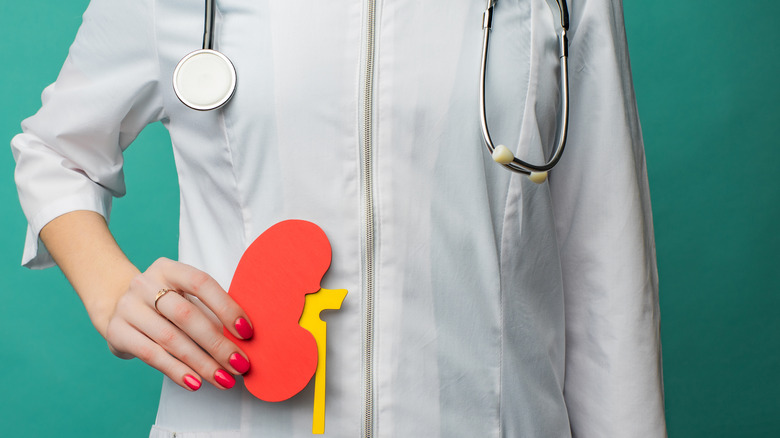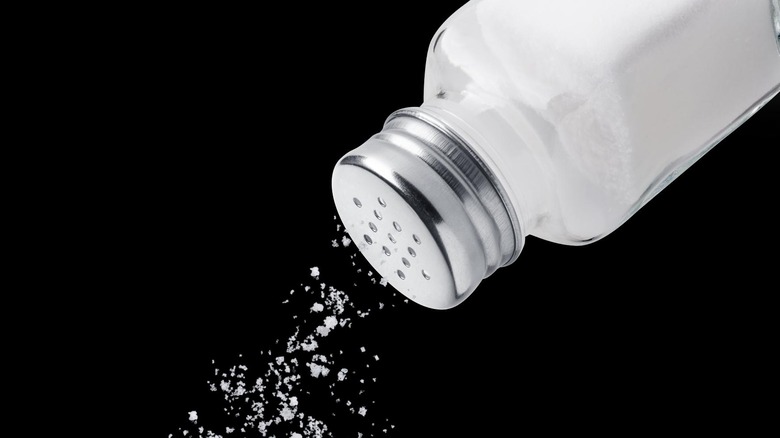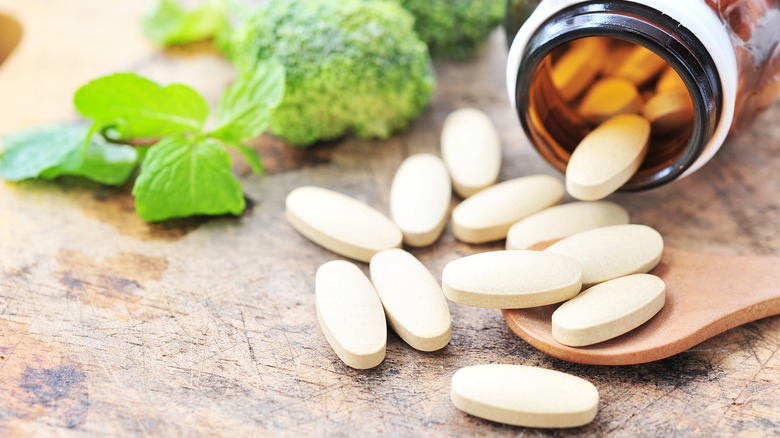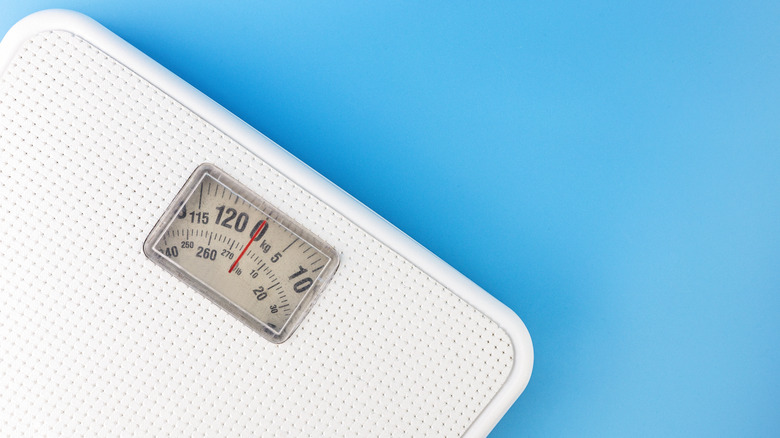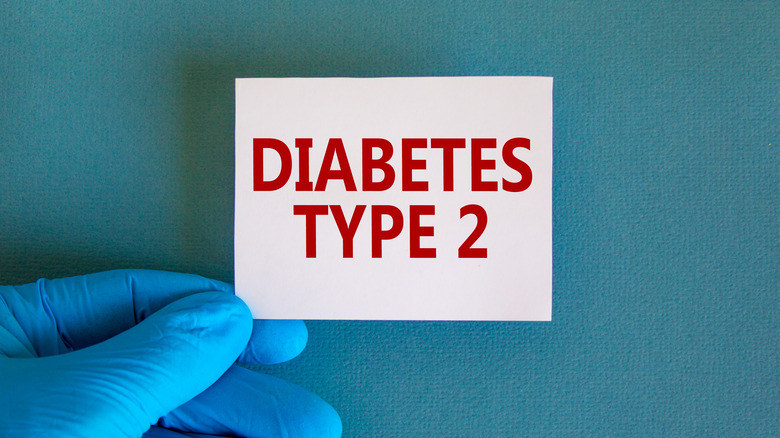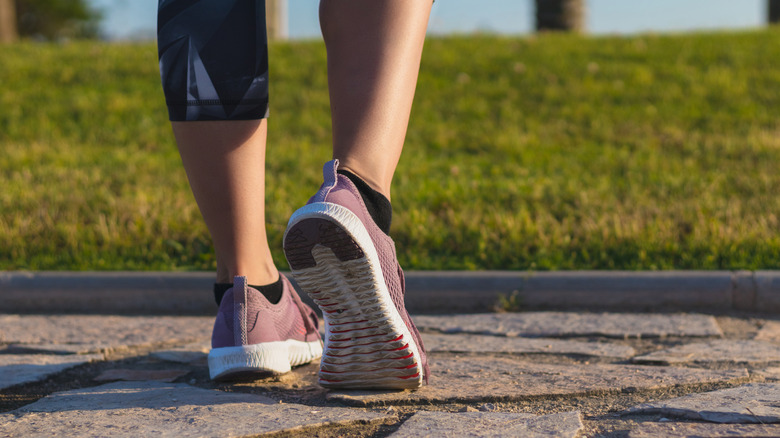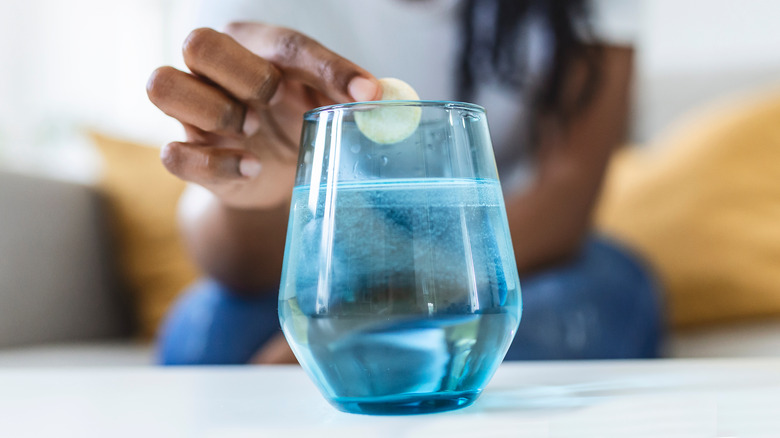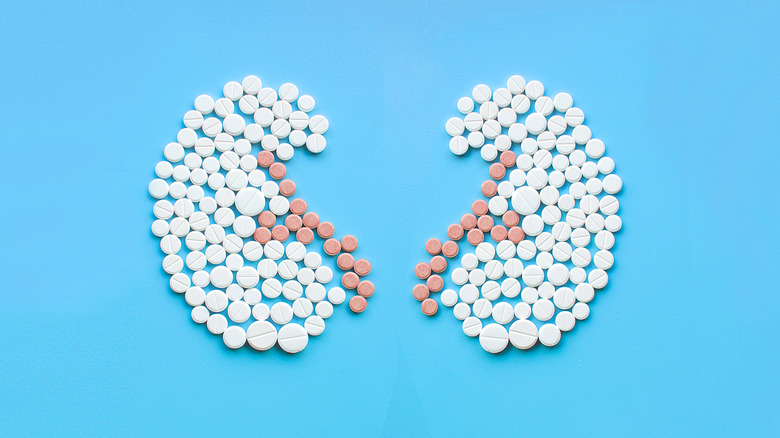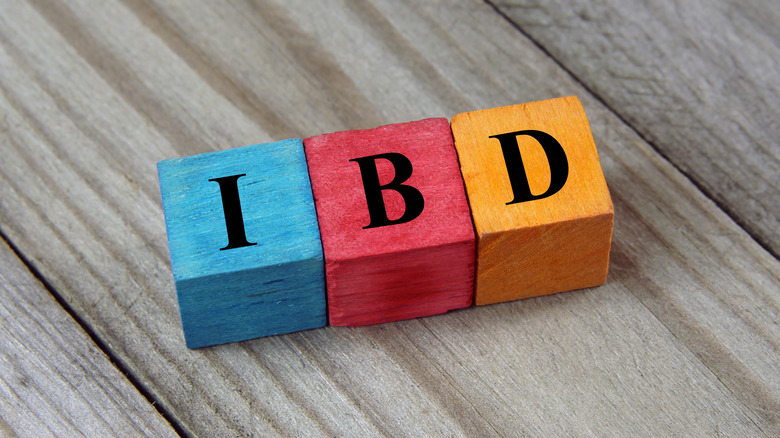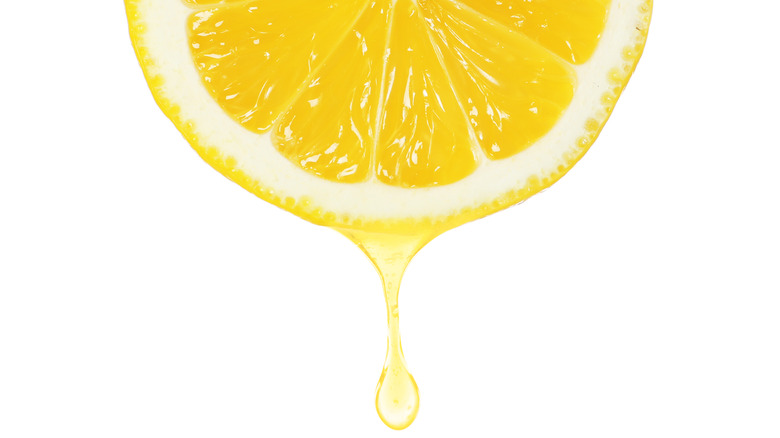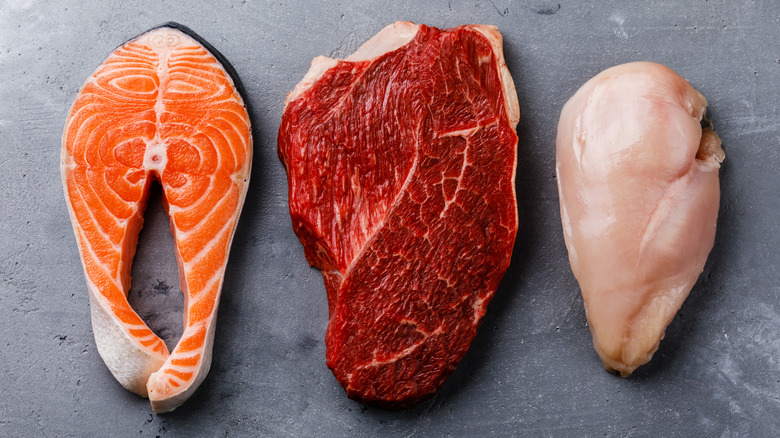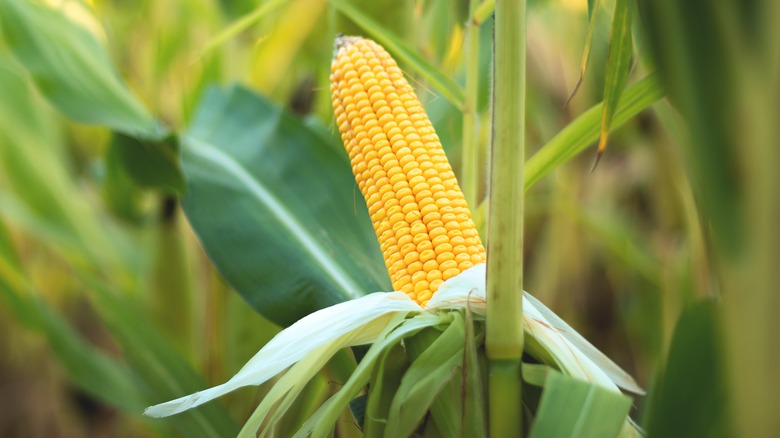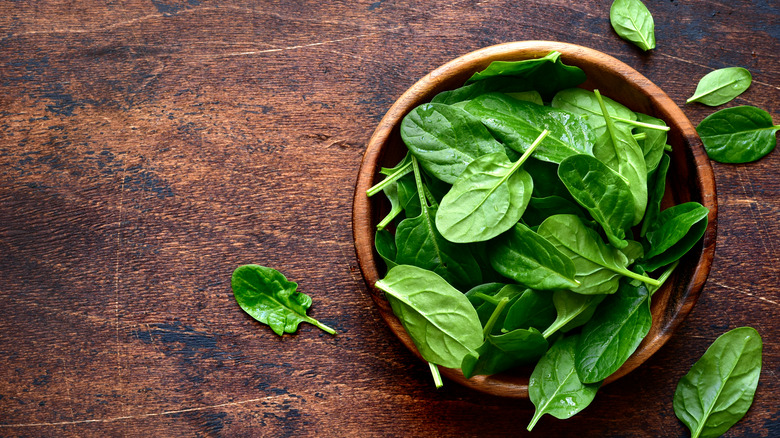What You Can Do To Decrease Your Risk Of Kidney Stones
If you've had kidney stones, there's a good chance you'll never forget the experience. And even if you've never had one, it's still easy to understand why they can be very unpleasant. As the Mayo Clinic explains, kidney stones are composed of salts and minerals, so they are like hard pebbles inside your kidneys. And while there's several different types of kidney stones according to what minerals they're made of and their possible risk factors, the symptoms for all of these stones can be very unpleasant.
Yes, kidney stones form inside the kidney, but they don't always stay there. Remember, your kidneys are connected to your bladder via tubes called the ureters. So, kidney stones can leave the kidneys and enter the ureters, making it harder for urine to move through these tubes normally. Once this happens, a person might experience waves of pain in multiple areas of their body, including their groin, their lower abdomen, and their back and side (specifically below their ribs). They may also feel like it burns when they urinate. And although passing a kidney stone might not do any real harm, that doesn't mean it isn't painful.
The good news is that there are things you can do to help lower your odds of developing kidney stones, even if you've had them in the past. Of course, you should always speak with your health care professional before making any changes to your diet and lifestyle.
Reduce salt intake
While there are different types of kidney stones, the most common ones are calcium stones (via Johns Hopkins). Aptly named, these stones tend to occur because of higher than normal amounts of calcium in one's urine. And if you're consuming too much salt, you're increasing your chances of developing this type of kidney stone.
As American Bone Health explains, one of the elements in salt is the acid chloride. Now, normally your kidneys can help your body remove high amounts of chloride. But your kidneys have their limits, and if they become overwhelmed by chloride levels, the body attempts to rebalance itself. When this occurs, more calcium winds up in the urine, which can make you more likely to develop kidney stones. And if you think skipping anything that literally says "salt" on it is enough to avoid kidney stones, think again.
Remember, the other major element in salt is sodium, and you'll often see that word on Nutrition Fact Labels. So, whether it says "salt" or "sodium," it can be a possible problem for your kidneys. And per the CDC, the U.S. Department of Health and Human Services has compiled a list of the 10 top sources of sodium in the U.S. These include cold cuts, cured meats, chicken, cheese, and eggs, as well as pizza, burritos, tacos, soups, breads, and rolls. Additionally, snacks like pretzels, crackers, popcorn, and chips made the list.
Stay hydrated
By now, we've all heard how important it is to drink water every day. But did you know that getting enough water is very important for your kidneys' overall health? As the National Kidney Foundation explains, water helps blood circulate throughout your body, which allows your kidneys to receive the nutrients they need to function properly. In addition, taking in the right amount of water can help your body filter wastes from your blood, so they can be expelled as urine.
Unfortunately, if you become dehydrated, that not only makes it harder for your kidneys to receive the nutrients that they need, but also increases the chances of developing more than one type of kidney stone (per the National Kidney Foundation). It's important to keep in mind that kidney stones form when different materials stick to one another. Water, however, helps prevent this from occurring, making it less likely for a stone to form.
In addition, being dehydrated makes you more likely to develop a urinary tract infection. According to the Mayo Clinic, the type of kidney stones known as struvite stones are more likely to form because of such infections. Also, health concerns like diarrhea and diabetes can cause dehydration. And a kind of kidney stone called uric acid stones usually form because of conditions like chronic diarrhea and diabetes causing too much fluid to be lost from the body.
Don't take too much vitamin C
Now, let's be clear. Vitamin C is important for your body. As Healthline explains, your immune system needs this nutrient to function properly. And it also helps keep your bones and brain healthy, as well as aids in your body's recovery from wounds (via the Indian Journal of Clinical Biochemistry). However, overdoing vitamin C, especially in supplement form, can increase your chances of developing a kidney stone.
According to Healthline, extra vitamin C isn't stored in the body. This is because vitamin C dissolves in water, making it a water-soluble vitamin. So, when you take in too much vitamin C, your body uses what it needs and then gets rid of the remaining amount of it, per the Indian Journal of Clinical Biochemistry. And if you guessed it leaves the body through urination, you'd be absolutely correct. But in order to make this work, the vitamin C becomes the waste product oxalate. And unfortunately, oxalate can be a component of kidney stones (via The New England Journal of Medicine).
Even though vitamin C supplements can be a possible factor for kidney stones, that doesn't mean cutting them out entirely is necessarily the right move. If you have concerns about the amount of vitamin C you're taking in, you should let a medical professional know not just how much vitamin C you take in supplement form, but also how much of it you consume daily. This way, they can advise you properly.
Maintain a healthy weight
Weight can be a sensitive topic. So, it's important to understand that there is no single perfect weight for everyone. As the Centers for Disease Control and Prevention (CDC) explains, the Body Mass Index or BMI of someone is based on both their weight and their height. In other words, what could be a healthy weight for one person might not be for someone else. And if a person is above their specific healthy weight range, that could make them more susceptible to developing kidney stones.
Reuters reported on a study in the Journal of Urology that explored the relationship between kidney stones and being above a healthy weight. Researchers from Johns Hopkins University looked at the medical records of more than 95,000 different individuals. They found certain patterns when it came to which of these individuals developed kidney stones. In terms of weight, the researchers used BMI and determined that one out of every 20 individuals who qualified as obese had been diagnosed as having kidney stones. In addition, these same individuals were more likely to need their kidney stones removed.
As a result of their study, the researchers concluded that "dietary modification and weight loss should be encouraged in the obese population for a multitude of reasons but also to reduce stone risk" (per Reuters). However, anyone who is above a healthy weight should speak with a health care professional, in order to lose weight in the safest way possible.
Manage your glucose
Without your circulatory system, your body couldn't get the materials it needs to function, including a sugar called glucose. But even though glucose is important, it can cause problems when you have too much of it. And if you're a type 2 diabetic, your body doesn't absorb glucose the way it's supposed to, which can cause kidney stones (per WebMD).
Before we go any further, it's important to understand insulin and its relationship to type 2 diabetes. Your body needs insulin to properly absorb glucose. But some individuals (like those with type 2 diabetes) develop insulin resistance, where cells in their body resist insulin. Because of this, these cells can't take in glucose the way they're supposed to, and all of this can lead to more calcium winding up in their urine. This additional calcium is what might increase the odds of developing kidney stones.
Besides possibly having more calcium in one's urine, type 2 diabetics who take insulin as part of their treatment plan could experience more acidic urine. And this could increase the chances of developing a type of kidney stone known as uric acid stones. But even if kidney stones are a concern, you should never change anything about your insulin schedule (when you take it, how much you take, etc.) without speaking with your health care professional first. According to WebMD, not taking insulin can be very dangerous and can lead to a diabetic coma.
Exercise regularly
It's no surprise that a healthy exercise routine can be very good for one's body on a number of levels. And, according to WebMD, a 2013 study found yet another reason to get yourself moving: Even a small amount of exercise on a weekly basis might lower your chances of having kidney stones by as much as 31%.
Now to be fair, this study only focused on postmenopausal women. With that said, the study concluded that even very light physical activities like gardening could make a difference when it came to developing kidney stones. "Even small amounts of exercise may decrease the risk of kidney stones," said the study's author, Dr. Mathew Sorensen. He also noted that "the intensity of the exercise does not seem to matter" in regards to whether or not someone develops kidney stones. Additionally, he said diet and weight management in combination with exercise proved helpful not just with reducing the chances of kidney stones forming, but also for "improving the health of our patients overall."
Although the study provided data about exercise's possible impact on kidney stone formation, Dr. John Lieske of the Mayo Clinic in Rochester, Minnesota, said additional research must be done since this study only focused on postmenopausal women (per WebMD). However, if you are concerned about kidney stones, you might want to speak with your health care professional about adding moderate exercise to your regular workout routine.
Don't take too many antacids
Did you know that there's more than one type of antacid? As Northwell Health's assistant professor of emergency medicine Dr. Robert Glatter told Prevention, there are four kinds, which all help with digestive system-related issues by reducing the acidity of the gastric acid in your stomach. The good news: Dr. Glatter says if you take antacids as recommended, they shouldn't have any "significant side effects" on your body. However, he cautioned that "long-term use of antacids can lead to effects on the digestive system, along with other organs."
So, if there are different types of antacids, what should you keep an eye out for if you're worried about kidney stones? Some antacids contain calcium, so taking antacids too often can raise the calcium levels in your blood. According to the Cleveland Clinic, this condition is known as hypercalcemia, and it does sometimes cause health problems like kidney stones. Also, keep in mind that taking calcium-containing antacids too often can lead to higher-than-normal amounts of calcium in one's urine, which (as Dr. Glatter points out) could cause kidney stones.
Besides hypercalcemia, overdoing antacids that have calcium can lead to milk-alkali syndrome, per Prevention. As Dr. Glatter explains, this condition causes the stomach lining to break down and can adversely affect the kidneys. "Milk-alkali syndrome can lead to kidney failure and deposition of calcium throughout organs, especially in the kidney."
Can diuretics help prevent kidney stones?
Have you ever heard of water pills? If so, then as the Mayo Clinic notes, you're familiar with diuretics. No matter what you call them, these medicines are designed to help you release more water and sodium from your body via your urine. And yes, one of the reasons a medical professional might prescribe someone diuretics is if they have kidney stones.
As NYU Langone Health states on its website, the treatment plan for a kidney stone patient includes reducing the chances of developing new stones in the future. One possible medication prescribed to help prevent more kidney stones from forming is a type of diuretic called thiazides. Why? Because while thiazide diuretics help your body release more fluids and sodium, they have the opposite effect on calcium. In other words, patients taking thiazides have lower levels of calcium in their urine, which can help reduce their chances of developing more kidney stones. And while the words "thiazide diuretic" might not appear on a medication's label, you're taking a thiazide diuretic if the label says chlorthalidone, indapamide, or hydrochlorothiazide.
While diuretics can be effective treatments for kidney stones, they can have side effects, according to Healthline. These include higher blood sugar and/or cholesterol levels, rashes, headaches, diarrhea, muscles cramps, gout, and dizziness. Furthermore, taking diuretics can lead to kidney failure. However, this is not a common occurrence.
Know your risk factors
From eye color to being able to roll one's tongue, there are many possible traits that can be passed down from generation to generation. Unfortunately, as Dr. Amy Krambeck points out (via the Mayo Clinic), if someone in your family has or had kidney stones, your chances of getting them doubles. But genetics is only one risk factor when it comes to this unpleasant condition.
Remember, your digestive system and your endocrine system are connected. So, when your digestive system is disrupted, your kidneys can also be negatively impacted, which can increase the odds of developing kidney stones. For example, chronic diarrhea can lead to a person having kidney stones. So can an inflammatory bowel disease (IBD) like ulcerative colitis and Crohn's disease (via the Crohn's & Colitis Foundation of America). Conditions aside, surgical procedures can also make someone more likely to develop kidney stones. These include gastric bypass surgery, where the stomach and small intestine are altered (per the UCLA).
Besides conditions and surgeries, someone living in a warmer area of the world is more likely to have kidney stones, as Dr. Krambeck explains on the Mayo Clinic's website. In all likelihood, this is because hotter weather raises the chances of the person becoming dehydrated. The bottom line is that if you have any possible risk factors for kidney stones, you should have a conversation with your health care professional, especially if you're considering having a surgical procedure like a gastric bypass.
Try citric acid
Before we explore this next item, let's make sure there's no confusion. While both citric acid and ascorbic acid are found in various fruits, they are not the same thing, according to the University of Wisconsin Hospital. Ascorbic acid is vitamin C, while citric acid is not a vitamin. And while you don't want to overdo vitamin C supplements (via Healthline), if you're worried about kidney stones, citric acid could be helpful if you've had them in the past and don't want to get them again.
Keep in mind that a person can have kidney stones inside of them and not realize it. This is because sometimes, kidney stones are so tiny that they don't cause any major health issues (via the University of Wisconsin Hospital). But if material sticks to these little stones, they can become larger and problematic. Fortunately, citric acid might help prevent this from happening. How? Well, when small kidney stones are covered with citric acid, material won't stick to them. In addition, citric acid breaks down tiny stones, helping to neutralize future kidney stones from forming.
While a number of fruits contain citric acid, limes and lemons are by far your best citrus fruit sources of this possibly kidney-stone busting substance. One possible way you can add more lemon and lime juice to your diet is adding them to the water in your ice cube trays.
Don't go overboard on animal-based proteins
Foods like chicken and cold cuts are already potentially bad for your kidneys because of their sodium content (via the Centers for Disease Control and Prevention). But that's not the only reason why you might need to cut back on animal-based food products, especially if you're concerned about kidney stones.
To fully understand why foods that are either made from or come from animals can up the chances of your body developing kidney stones, we need to discuss purines. As the Cleveland Clinic explains, these are chemicals found in foods like red meat and seafoods, including lobster, salmon, sardines, and shrimp. When your body digests and processes such foods, it breaks down these purines and produces a waste product called uric acid. And if you guessed uric acid can cause kidney stones, you're absolutely right. In fact, a type of kidney stone is named uric acid stones (per the Mayo Clinic).
Besides beef and fish, a study published in The Journal of Urology states that chicken was also a source of purines. And while the study found that beef was the most likely to lead to kidney stones among the three animal-based products, the researchers concluded that "Stone formers should be advised to limit the intake of all animal proteins ..." Of course, this doesn't necessarily mean you need to give up all animal products entirely. But starting a food journal can help you determine if you're consuming too much of any type of food.
Avoid too much high-fructose corn syrup
While lemons and limes have high amounts of citric acid (which, as the University of Wisconsin Hospital explains, might help prevent kidney stones from developing), that doesn't mean anything containing these fruits is good for your kidneys. According to WebMD, some beverages that have fruit juices also have high-fructose corn syrup, which can up your chances of kidney stones.
As its name suggests, high-fructose corn syrup comes from corn and is used as a cost-efficient sweetener, per WebMD. Now, it's important to point out that the research into high-fructose corn syrup has mostly not focused on humans, and a number of them involve extremely high amounts of this substance. But with that said, findings have pointed to two possible reasons why consuming too much high-fructose corn syrup might lead to the formation of kidney stones. For starters, data has linked higher levels of uric acid with consuming high-fructose corn syrup. An abundance of uric acid can lead to kidney stones, according to the Cleveland Clinic. Furthermore, consuming large amounts of high-fructose corn syrup could cause another possible kidney stone risk factor: obesity.
Even if you're not a big fan of fruit-flavored beverages, that doesn't mean you're not eating or drinking high-fructose corn syrup. As WebMD notes, soft drinks, cereals, yogurts, and even soups could contain this sweeter. So, make sure to check a product's list of ingredients.
Can spinach cause kidney stones?
Spinach is often praised as a fantastic food for your overall health. But there are concerns that this leafy green might be a risk factor when it comes to kidney stones. That said, there's a great deal to consider before you decide whether or not to cut down on the spinach in your diet.
Harvard lists spinach on their website as one of the "stone-forming foods" that should be either consumed less or avoided entirely if someone has kidney stones. The reason is that spinach is a good source of oxalates (per Healthline). And Harvard specifically states that high amounts of oxalates could promote the formation of kidney stones. However, as registered dietitian Dr. Kristina Penniston stated (via the University of Wisconsin-Madison Health), "The foods that are highest in oxalate are also high in fiber, magnesium, potassium, and phytate," which could help reduce the chances of developing kidney stones.
There's still one more factor to keep in mind. According to Science Direct, spinach isn't just loaded with oxalates, but also essential nutrients like vitamins K1, E, and A, as well as vitamins B6 and B9. And yet, it also has vitamin C, which Healthline cautions could increase the odds of developing kidney stones when taken in excess (although Healthline focused more on supplements than food sources). The bottom line is that everyone has different levels of risk when it comes to kidney stones, so speak with your health care professional before changing your diet.
Be careful about consuming alcohol
Does alcohol cause kidney stones? While there's been strong evidence to support other kidney stone risk factors, that's not the case with alcohol, according to the Cleveland Clinic. But that doesn't mean alcohol consumption — especially in excess — is unlikely to increase the chances of developing kidney stones.
For one, alcohol can cause dehydration, which could up your chances of forming these unpleasant little stones. As Healthline explains, drinking alcohol usually means more trips to the bathroom to urinate. And this more frequent urination can make someone dehydrated. But beyond the inconvenience of needing to "go" more often, alcohol can also be taxing on your kidneys. Keep in mind that these two organs help to make sure you have the right amount of electrolytes and water in your system. Alcohol, however, makes this harder for your kidneys to do, hurting how your kidneys function and leaving them more susceptible to the formation of kidney stones.
Besides the connection between alcohol and dehydration, the purines in alcohol can lead to another medical issue called gout (via the Cleveland Clinic). Basically, your body turns purines into uric acid, which can become sharp crystals that affect one's joints. And if you have gout, there's a higher possibility that you'll develop kidney stones. Additionally, if you already have kidney stones, alcohol could worsen kidney stone-related pain, per Healthline. This is because kidney stones tend to move around more quickly in your body when you drink alcohol.

